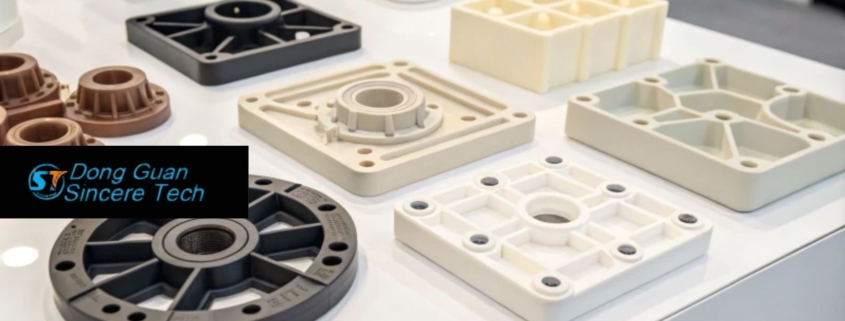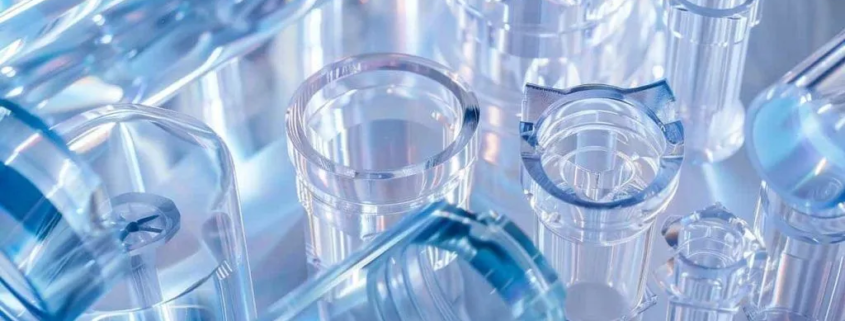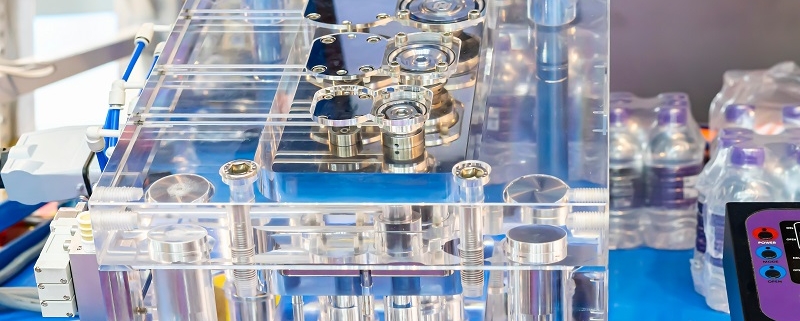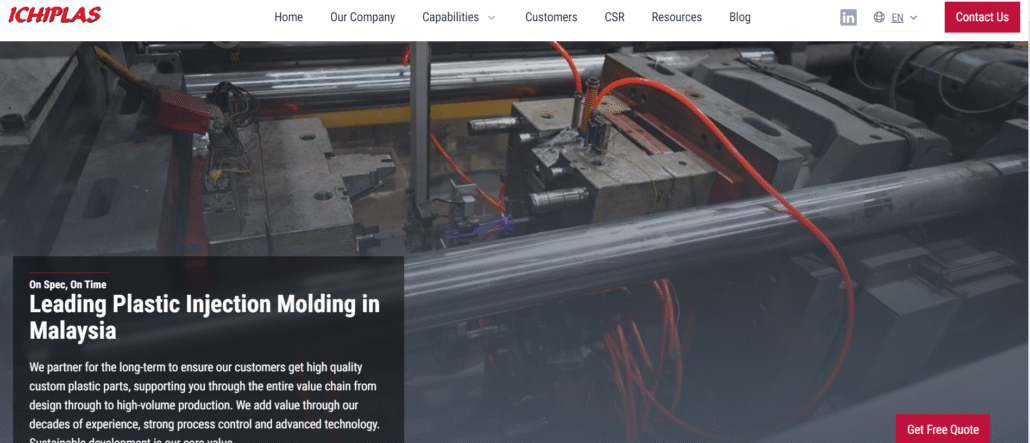Cam dolgulu naylon Enjeksiyon kalıplama, günümüz imalatında çok önemli bir süreçtir. Bu süreç, cam elyafı gibi esnek ve güçlü plastiklerin bir araya getirilmesiyle hafif, güçlü ve hassas parçaların ortaya çıkmasını sağlar. Yüksek stres ve yüksek sıcaklık bileşenleri. Çok sayıda endüstri, tutarlı bir kaliteye sahip yüksek gerilimli ve yüksek sıcaklıklı bileşenler üretmek için cam dolgulu naylon enjeksiyon kalıplamayı kullanabilir.
Üreticiler bu malzemeyi, performanstan ödün vermeden büyük hacimlerde üretim yapmalarını sağladığı için kullanmaktadır. Günümüzde otomotiv, elektronik ve endüstriyel süreçler, güçlü, güvenilir ve uygun maliyetli bileşenler sağlamak için bu sürece ihtiyaç duymaktadır.
Cam Dolgulu Naylon Nedir?
Poliamid takviyeli malzeme cam dolgulu naylondur. Naylon, geliştirilmiş mekanik özelliklere sahip bir malzemeye dönüştürmek için küçük cam elyaflarla karıştırılır. Cam dolgulu naylonun enjeksiyon kalıplaması kullanılır, bu da düz naylonla karşılaştırıldığında daha sert, daha güçlü ve ısıya dayanıklı bir parça oluşturur.
Cam elyafların dahil edilmesi, soğutma işleminin çarpıklığını ve büzülmesini azaltır. Nihai ürünün doğru boyutta olmasını sağlar ve bu da endüstri ve otomobil alanlarında hayati önem taşır.

Cam dolgulu naylonun temel özellikleri şunlardır:
- Yüksek gerilme mukavemeti
- Yüksek düzeyde boyutsal kararlılık.
- Hemolitik ve kemolitik direnç.
- Metallere kıyasla hafiftir.
Cam dolgulu naylon enjeksiyon kalıplama üretimi sadece parçaların dayanıklılığını garanti etmekle kalmaz, aynı zamanda seri üretim söz konusu olduğunda bunları uygun maliyetli hale getirir.
Fiziksel, Kimyasal ve Mekanik Özellikler
Enjeksiyon kalıplama cam dolgulu naylon başlıklı makale, yüksek derecede esnekliğe sahip naylon ile yüksek mukavemete sahip ve benzersiz özellikler kazandıran cam elyafların bir karışımıdır. Bunların bilinmesi, güvenilir bileşenlerin oluşturulmasına yardımcı olur.
Fiziksel Özellikler
- Yoğunluk: 1.2 -1.35 g/cm 3, dolgusuz naylondan biraz daha ağırdır.
- Su Emme: 1-1.5% (30% cam dolgulu) elyaf içeriği arttıkça düşer.
- Termal Genleşme: Düşük boyutsal kararlılık katsayısı (1535 µm/m -C)
Kimyasal Özellikler
- Direnç: Yakıtlara, yağlara ve kimyasalların çoğuna karşı yüksek.
- Yanıcılık: A V-2 ila V-0, dereceye bağlı olarak.
- Korozyon: Metaller gibi aşınmaz, elverişsiz ortamlarda mükemmeldir.
Mekanik Özellikler
- Çekme Dayanımı: 120-180 Mpa ve elyaf içeriğine bağlıdır.
- Eğilme Dayanımı: 180-250 MPa.
- Darbe Dayanımı: Orta ve lif içeriği arttıkça azalır.
- Sertlik: Sertliği yüksektir (5 8Gpa), bu da sert yük taşıyıcı bileşenler sunar.
- Aşınma Direnci: Dişlilerde, yataklarda ve hareketli elemanlarda üstündür.
Enjeksiyon Kalıplama Süreci
Cam dolgulu naylon enjeksiyon kalıplama, kompozit malzemenin eritilmesi ve ardından yüksek basınç altında bir kalıba enjekte edilmesiyle yapılır. Prosedür birkaç adıma bölünebilir:
- Malzemenin hazırlanması: Uygun miktarda cam elyafı ve Naylon pelet bileşimi karıştırılır.
- Eritme ve enjeksiyon: Malzeme eriyene kadar ısıtılır, ardından bir kalıptan geçirilir.
- Soğutma: Bu, liflerin sabitlendiği bir katılaştırma işlemidir.
- Fırlatma ve bitirme: Katının ilk hali kalıptan çıkarılır ve muhtemelen kırpılır ya da cilalanır.
Enjeksiyon kalıplama cam dolgulu naylondaki cam elyaflar, soğuduktan sonra parçanın şeklini ve gücünü kaybetmemesine yardımcı olur. Bu özellikle sıkı toleranslı ve çok karmaşık tasarımlarda gereklidir.

Cam Dolgulu Naylon Kullanmanın Avantajları
Cam dolgulu naylon enjeksiyon kalıplama malzemesi, geleneksel bir malzemeye kıyasla çeşitli avantajlar sunar:
- Güç ve dayanıklılık: Cam elyaf kullanımı ile çekme ve eğilme mukavemeti elde edilir.
- Isı direnci: Bu, bileşenlerin deforme olmadan yüksek sıcaklıklara dayanabileceği anlamına gelir.
- Boyutsal doğruluk: Daha az büzülme, farklı partilerin benzerliğinin bir güvencesidir.
- Hafif: Malzeme güçlüdür, ancak hafifletildiğinde otomotiv ve havacılık kullanımlarında daha verimli hale gelir.
- Maliyet verimliliği: Üretim süresinin kısalması ve atıkların azalması maliyetleri düşürecektir.
Genel olarak, enjeksiyon kalıplama cam dolgulu naylon terimi, yüksek performanslı parça üreticilerinin parçalarını verimli bir şekilde oluşturmalarını ve modern endüstrinin ihtiyaçlarını karşılamalarını sağlar.
Cam Dolgulu Naylon İşleme Uçları
Ne zaman cam dolgulu naylon enjekte etme, malzemenin davranışına ve makinenin ayarlarına dikkat etmek önemlidir. Akış, soğutma ve termal özellikler cam elyafların varlığıyla değişir. Doğru talimatlar izlendiğinde, cam dolgulu naylon enjeksiyon kalıplama sağlam, doğru ve kusursuz bileşenlerle sonuçlanabilir.

Malzeme Hazırlama
Cam dolgulu naylon, nem emici bir malzeme olarak kolayca kullanılır. Islak malzeme kabarcıklara, boşluklara ve kötü yüzey kalitesine yol açabilir. Malzemeyi 80-100 °C'de 46 saat içinde kurutun. Düzgün bir mukavemet elde etmek için cam liflerinin naylon içinde bir araya toplanmadığından emin olun.
Erime Sıcaklığı
Önerilen naylon sınıfı erime sıcaklığını koruyun:
- PA6: 250-270°C
- PA66: 280-300°C
Aşırı sıcaklık naylonu bozabilir ve lifleri bozabilirken, aşırı düşük sıcaklık zayıf akışa ve cam dolgulu naylonun enjeksiyon kalıplamasında yetersiz doluma neden olur.
Enjeksiyon Basıncı ve Hızı
Orta düzeyde enjeksiyon hızı ve basıncı: 70 -120 Mpa normaldir. Hızlı enjeksiyon lifleri deforme edebilir ve lifler içinde gerilime neden olabilir. Uygun hız sadece düzgün akışa izin vermekle kalmaz, aynı zamanda tutarlı elyaf oryantasyonu üreterek daha güçlü parçalara yol açar.
Kalıp Sıcaklığı
Yüzey kalitesi ve boyutsal doğruluk kalıbın sıcaklığına bağlıdır. 80-100°C'yi koruyun. Kalıbın düşük sıcaklıkları eğrilme ve çökme izlerine neden olabilirken, yüksek sıcaklıklar akışı artırır ve döngü süresini azaltır.
Soğutma Süresi
Duvar kalınlığı soğutma süresine eşit olmalıdır. Çok kısa olursa eğrilir, çok uzun olursa daha az verimli olur. Uygun soğutma kanalları, cam dolgulu naylon enjeksiyon kalıplamada eşit soğutma ve doğru boyutların sağlanmasına yardımcı olur.
Çıkarıldıktan ve işlemden geçirildikten sonra bu hale gelir
Düzgün fırlatma elde etmek için 1-2 derecelik çekim açıları kullanın. Lifleri çekebilecek veya parçayı koparabilecek çok fazla çıkarma kuvvetinden kaçınmak önemlidir. İşlemden sonra, iç gerilimi gidermek için kırpma, parlatma veya tavlama olabilir.
Elyaf İçeriği Değerlendirmesi
Cam elyaf içeriği genellikle ağırlık olarak 30 50%'dir. Elyaf içeriğindeki artış mukavemeti, sertliği ve ısı toleransını artırır, ancak darbe tokluğunu azaltır. Elyaf içeriğine göre ayarlama yaparak kusurları önlemek için işleme parametrelerini kontrol edin.
Potansiyel Cam Dolgulu Naylon İkameleri
Enjeksiyon kalıplama ile cam dolgulu naylon güçlü ve dayanıklı olsa da, bazen belirli gereksinimlerde kullanılacak daha iyi malzemeler vardır.
- Dolgusuz Naylon (PA6/PA66): Naylon hafiftir, daha ucuzdur ve çalışması daha kolaydır ve düşük gerilimli işlerde tavsiye edilir, ancak cam dolgulu naylon kadar sert değildir.
- Polikarbonat (PC): Darbe dayanımı ve ısı direnci yüksektir ve sertlik cam dolgulu naylon enjeksiyon kalıplamadan daha azdır.
- Polifenilen Sülfür (PPS): Bu, hem kimyasal hem de ısı direnci açısından çok güçlüdür ve yüksek sıcaklık uygulamalarında pahasına kullanılabilir.
- Asetal (POM): Boyutsal kararlılık, düşük sürtünme ve zayıf ısı direnci ve sertlik.
- Elyaf Takviyeli Kompozitler: Karbon veya aramid takviye lifleri daha güçlü, daha sert, işlenmesi daha karmaşık ve maliyetlidir.

Cam Dolgulu Naylon Özellikleri
Enjeksiyon kalıplama şeklindeki cam dolgulu naylon, uygulamaların zorlu doğasına dayanmasını sağlayan iyi mekanik ve termal özellikleri nedeniyle tercih edilir. Cam elyaflı naylon ilavesi, malzemenin mukavemetini, sertliğini ve boyutsal stabilitesini artırır. İşte ana özellikler:
Yüksek Çekme Dayanımı
Naylon içeren camlar yüksek çekme ve germe kuvvetlerine karşı dayanıklıdır. Bu da cam dolgulu naylon enjeksiyon kalıplamayı otomotiv ve endüstriyel uygulamalardaki yapısal bileşenler için uygun hale getirir.
Mükemmel Isı Direnci
Cam elyaflar, parçaların yüksek sıcaklıklarda güçlü olabilmesi için termal kararlılığı artırır. Bu, motor ısısına veya elektronik ekipmana maruz kalan elemanlar için çok önemlidir.
Boyutsal Kararlılık
Cam elyaflar, soğutma sırasında büzülme ve deformasyonu en aza indirir. Cam dolgulu naylon enjeksiyon kalıplama işlemi, karmaşık tasarımlarda bile şeklini kaybetmeyen parçalar ve doğru ölçümler oluşturur.
Geliştirilmiş Sertlik
Cam dolgulu naylon normal naylondan daha serttir ve basınç altındayken bükülme olasılığı yoktur. Bu, dişliler, braketler ve mekanik muhafazalar için uygundur.
Moda ve Sürtünme Direnci
Cam elyaflar ayrıca aşınma direncini artırarak hareketli parçalardaki aşınmayı azaltır. Özellikle yüksek sürtünmeli ortamlarda uygulanabilen cam dolgulu naylon enjeksiyon kalıplama kullanılarak bileşenlerin hizmet ömrü uzatılır.
Hafif
Güçlü olmasına rağmen, cam dolgulu naylon metal ürünlerden önemli ölçüde daha hafiftir, bu nedenle ağırlık azaltmanın önemli olduğu otomotiv bileşenlerinde, havacılıkta ve elektronik ürünlerde kullanılır.
Kimyasal Direnç
Naylon cam dolguludur ve yağlara, yakıtlara ve çoğu kimyasala dayanabilir ve bu nedenle zorlu ortamlar için uygundur. Bu, endüstri veya otomotiv parçalarında dayanıklılığı garanti edecektir.
Cam Dolgulu Naylon Çeşitleri
Cam dolgulu naylonun, her biri enjeksiyon kalıplama cam dolgulu naylon ve cam dolgulu naylon enjeksiyon kalıplamada belirli bir şekilde kullanılmak üzere tasarlanmış çeşitli türleri vardır.

Cam Dolgulu PA6
Cam elyaflarla güçlendirilmiş Naylon 6 (PA6), aşınma direnci ile güçlü ve serttir. Çoğunlukla endüstriyel ve araba parçalarında uygulanır.
PA66 Cam Dolgulu
PA66 (Naylon 66) ısıya daha dayanıklıdır ve PA6'dan biraz daha iyi mekanik özelliklere sahiptir. Motor bileşenleri veya elektrik muhafazaları gibi yüksek sıcaklık uygulamalarında mükemmel olacaktır.
PA6/PA66 Cam Dolgulu Karışımlar
Karışımlar PA6'nın sertliğini ve PA6,6'nın ısıya dayanıklılığını bir araya getirerek mukavemet, sertlik ve boyutsal kararlılık arasında bir denge sağlar.
Özel Sınıflar
Cam dolgulu naylonlar bazen elektronik, dış mekan parçaları veya güvenlik ekipmanlarında kullanılmak üzere yağlayıcılar, aleve dayanıklı malzemeler veya UV stabilizatörleri içerir.
Cam Dolgulu Naylon Enjeksiyon Kalıplama Kullanım Alanları
Cam dolgulu naylon enjeksiyon kalıplama, mukavemeti, ısı direnci ve doğruluğu nedeniyle çok çeşitli endüstrilerde çok sayıda uygulama bulmaktadır. Yaygın kullanım örnekleri şunlardır:

Otomotiv
- Dişliler ve burçlar
- Braketler ve muhafazalar
- Klipsler ve bağlantı elemanları
Elektronik
- Elektrik konnektörleri
- Anahtar muhafazaları
- Yalıtım bileşenleri
Endüstriyel Makineler
- Aşınmaya dayanıklı parçalar
- Makine fonksiyonel parçaları.
Tüketici Ürünleri
- Cihaz bileşenleri
- Spor ekipmanları
- Dayanıklı muhafazalar
Bu uygulamalarda enjeksiyon kalıplamada camla doldurulmuş naylon uygulamak, zor koşullarda bile uzun ve güvenilir çalışmayı garanti edecektir.
Cam Dolgulu Naylon Enjeksiyon Kalıplama Tasarım Kılavuzları
Cam dolgulu naylon enjeksiyon kalıplamada kullanılacak bileşenlerin mümkün olduğunca güçlü, hassas ve aynı zamanda dayanıklı olmasını sağlamak için çok dikkatli bir şekilde tasarlanması gerekir.

Duvar Kalınlığı
- Batma ve eğilmeyi önlemek için benzer duvar kalınlığına sahip olmalıdır.
- Cam dolgulu naylon parçaların çoğu, yük gereksinimine bağlı olarak 2-5 m kalınlıkta önerilmelidir.
Elyaf yapısının zayıflamasına neden olabileceğinden çok ince kesitlerden ve düzensiz soğumaya ve iç gerilmelere yol açabileceğinden kalın kesitlerden kaçınılmalıdır.
Köşe Yarıçapları
- Keskin köşeler yuvarlatılmış olanlarla değiştirilmelidir.
- Gerilme konsantrasyonu, duvar kalınlığının 0,5 ila 1,5 katı arasında bir yarıçap ile en aza indirilir.
- Enjeksiyon kalıplama cam dolgulu naylon, elyaf kırılmalarına veya çatlaklara neden olabilecek keskin kenarlara sahiptir.
Kaburga Tasarımı
- Kaburgalar malzeme eklemez ve ürünü daha sert hale getirir.
- Bitişik duvarın 50 ila 60% nervürlerinin bakımı.
- Nervürlerin yüksekliği duvar kalınlığının 3 katından fazla olmamalıdır; aksi takdirde batma izleri ve çarpılma meydana gelecektir.
Doğru nervür tasarımı, camla doldurulmuş naylon enjeksiyon kalıplamada mukavemeti ve boyutsal kararlılığı artırır.
Patron Tasarım
- Vida bağlantıları patronlarla yapılır.
- Duvar ve alttaki filetoların kalınlığı 1:1 oranında olmalıdır.
Uzun ince çıkıntılardan kaçınılmalıdır çünkü bunlar cam dolgulu naylon enjeksiyon kalıplama ile kürleme sırasında eğrilebilir.
Taslak Açıları
- Kalıptan kolayca çıkarılabilmeleri için asla bir çekim açısı bırakmayın.
- Dikey duvarların her iki tarafında minimum 1-2 derecelik bir hava akımı olmalıdır.
Kalıptan çıkarma sırasında çizikler, deformasyon ve elyaf çekilmesi, uygun çekim sürecinde önlenebilir.
Elyaf Esnekliğinin Yönü.
- Enjeksiyon kalıplama cam dolgulu naylondaki cam elyaflar, enjekte edilirken akış yönünde aşağı doğru hareket edecek şekilde yönlendirilir.
- Maksimum mukavemet elde etmek için gerilme yolları elyafa paralel ve normal olacak şekilde tasarım ayrıntılarını alın.
Mekanik performansta düşüşe neden olabileceğinden liflerin demetlenmesine veya yanlış hizalanmasına yol açan özelliklerden kaçınılmalıdır.
Büzülme ve Çarpılma
Cam dolgulu naylon da dolgusuz naylona kıyasla daha az çeker, ancak eşit olmayan duvar kalınlığı eğrilmeye neden olabilir.
Minimum boyutsal varyasyon sağlamak için değişken duvar kalınlığı, nervürler ve yetersiz soğutma kanalları kullanılmalıdır.
Yüzey İşlemi
- Bu, cam elyafların varlığı nedeniyle yüzeyin biraz daha pürüzlü olmasına neden olabilir.
- Pürüzsüz bir yüzeyin çok önemli olması durumunda cilalı kalıplar veya işlem sonrası uygulayın.
- Cam dolgulu naylon enjeksiyon kalıplamadaki liflerin yönünü değiştirmemek için çok fazla parlatmayın.
Popüler Komplikasyonlar ve Çözümleri
Enjeksiyon kalıplı cam dolgulu naylon etkili olsa da bazı zorluklar ortaya çıkarmaktadır:
- Lif kopması: Karıştırmada aşırı kesme olduğunda meydana gelir.
- Çare: Karıştırma süresini ve çözelti vidalarının hızını ayarlayın.
- Parçaların bozulması: parçalar eşit olmayan soğutma nedeniyle deforme olabilir.
- Çare: Kalıbın sıcaklığına ve kalıp tasarımına ince ayar yapın.
- Yüzeylerin pürüzlülüğü: elyaflar düzensiz yüzeyler sağlayabilir.
- Çözüm: Cila kalıpları ve işlemleri.
- Su alımı: naylon su emicidir ve bu da kaliteyi etkiler.
- Çözüm: Kalıplamadan önce malzemeler önceden kurutulmalıdır.
Üreticiler bu sorunları ele alarak cam dolgulu naylondan maksimum düzeyde faydalanabileceklerdir.
Çevre ve Maliyet Değerlendirmeleri
Metallerin kullanıldığı bazı durumlarda, cam dolgulu naylon enjeksiyon kalıplama daha çevre dostudur:
- Daha az enerji kullanımı: Daha hafif malzemeler üretimde enerji kullanımını en aza indirecektir.
- Daha az malzeme atığı: Doğru kalıplama ile hurda en aza indirilir.
- Uzatılmış ürün ömrü: Dayanıklı parçalar daha az değiştirme gerektirir, dolayısıyla çevresel etki düşüktür.
Artan hız ve azalan atıklar sayesinde maliyetleri düşürme avantajı da vardır, bu da enjeksiyon kalıplama cam dolgulu naylonun büyük ölçekli üretimde uygun bir seçim olacağı anlamına gelir.
Üreticilerin En İyi Uygulamaları
Cam dolgulu naylon enjeksiyon kalıplama kullanımını başarılı kılmak için en iyi uygulamalar şunlardır:
- Neme bağlı kusurları önlemek için önceden kurutulmuş malzemeleri silin.
- Eşit fiber dağılımı Uygun vida tasarımı kullanın.
- Kalıpların sıcaklığını ve enjeksiyon hızını en üst düzeye çıkarın.
- Eğilme olmadığından emin olmak için monitörün soğutmasını kontrol edin.
- Yüksek kaliteli kalıpların yüzeyleri kullanılmalıdır.
Bu uygulamaları takip ederek mükemmel performansa sahip yüksek kaliteli ve tutarlı parçalar elde edilecektir.
Gelecek Trendleri
Cam dolgulu naylon enjeksiyon kalıplama uygulaması şu nedenlerle artmaktadır:
- Hafif otomotiv parçalarına daha fazla ihtiyaç duyulması.
- Tüketici elektroniği yüksek performanslıdır. Endüstriyel otomasyonda kullanılan ısıya dayanıklı bileşenler.
Elyafı daha iyi hizalayabilmek, döngü süresini kısaltmak ve bu malzemenin geri dönüştürülebileceği süreyi artırmak için araştırmalar devam etmektedir, böylece gelecekte daha da faydalı olabilir.
Sincere Tech Hakkında
Web sitesi: https://plas.co
Sincere Tech, plastik enjeksiyon kalıplama hizmetleri sunan saygın bir firmadır. Cam dolgulu naylon enjeksiyon kalıplama konusunda uzmanız.
Ne Yapıyoruz
Güçlü ve hassas parçalarımız otomotiv, elektronik ve endüstriyel uygulamalarda kullanılmaktadır. Her bir parça yüksek kalite standartlarına uygunluk açısından denetlenir.
Neden Bizi Seçmelisiniz
- Uzun ömürlü ve yüksek kaliteli parçalar üretiyoruz.
- Personelimiz son derece nitelikli ve profesyoneldir.
- Uygun maliyetli ve hızlı çözümler sunuyoruz.
- Müşteri memnuniyetine önem verdik.
Sincere Tech'de sizi tatmin edecek kaliteli ürünler sunacağız.
Sonuç
Cam dolgulu naylon enjeksiyon kalıplama ve enjeksiyon kalıplama cam filled naylon enjeksiyon kalıplama günümüz imalatında çok önemli süreçlerdir. Bunlar güçlü, ısıya dayanıklı, boyutsal olarak kararlı ve uygun maliyetlidir. Bir otomobilde, elektronik veya endüstriyel makinede, yüksek performanslı, dayanıklı ve güvenilir bileşenler sağlamak için cam dolgulu naylon kullanılabilir. Üreticiler en iyi uygulamaları, tasarımı ve süreç kontrolünü kullanarak yüksek kaliteli ve tutarlı sonuçlar elde edebilmektedir. Cam dolgulu naylon enjeksiyon kalıplama, mukavemet, hafiflik ve düşük maliyet açısından endüstri için en uygun ve etkili çözümlerden biri olmuştur.

































































































